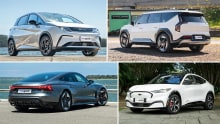
Watch out, Audi! How Lexus staged a sales comeback in 2023 off the back of updated Lexus RX, NX and UX SUVs
The cold, hard facts of the 2022 sales data were not good for Lexus. The brand...
Browse over 9,000 car reviews
.jpg)
The world has changed dramatically in the past 18 months and every aspect of life has been impacted by the global pandemic, including the cars we drive.
Since the early days of the pandemic in 2020, when car makers around the world began shuttering factories to try and curb the spread of the virus, it began a chain reaction that has led to limited stock in showrooms and now car companies are openly considering cutting back on the amount of technology they offer in cars.
So, how did we get here? What does it mean to those looking to buy a car? And what is the solution?
According to Britannica.com, a semiconductor is “any of a class of crystalline solids intermediate in electrical conductivity between a conductor and an insulator”.
Broadly speaking, you can think of a semiconductor as a microchip, a tiny piece of technology that helps so much of the modern world run.
Semiconductors are used in everything from cars and computers to smartphones and even household goods such as televisions.

It’s a classic case of supply and demand. With the pandemic forcing people around the world to work from home, not to mention kids doing classes online, the demand for technology items like laptops, monitors, webcams and microphones ramped up.
However, semiconductor manufacturers assumed demand would decline as other industries (including automotive) slowed due to pandemic restrictions.
The majority of semiconductors are produced in Taiwan, South Korea and China, and those countries have been impacted as badly as anywhere else by COVID-19 and took time to recover.
By the time those plants were fully operational, there was a major gulf between the demand for semiconductors and the available supply across so many manufacturers.
The Semiconductor Industry Association reported that demand for its product increased by 6.5 per cent in 2020 amid all the various shutdowns around the world.
The time taken to produce chips - some can take months from start to finish - combined with the long lead times to ramp up production, has left manufacturing industries around the world in a difficult position.
The problem for the car industry is complicated. For starters, many brands began cutting back on their semiconductor orders early in the pandemic, anticipating reduced sales. On the contrary, car sales remained strong as people either wanted to avoid public transport or splurge on a new car instead of holidaying.
While all industries have been impacted by this chip shortage, the difficulty for the automotive industry is that cars don’t rely on just one type of semiconductor, it needs both the latest versions for things like infotainment as well as less-advanced ones for components like power windows.
Despite this, car makers are actually relatively small customers compared to the likes of tech giants like Apple and Samsung, so they haven’t been given priority, resulting in further problems.
The issue wasn’t helped by a fire at one of Japan’s largest chip producers in March this year. The damage caused to the factory stopped production for approximately a month, further reducing global supply.

Every car maker has been impacted by the semiconductor shortage, although exactly how badly is hard to determine accurately as the crisis is ongoing. What we do know is that it has affected most brands’ ability to produce cars and will continue to cause supply constraints for some time to come.
Even the biggest manufacturers aren’t immune, with Volkswagen Group, Ford, General Motors, Hyundai Motor Group and Stellantis all forced to slow production around the world.
Volkswagen CEO Herbert Diess was quoted saying his group had been unable to build approximately 100,000 cars due to a lack of semiconductors.
General Motors was forced to idle factories in the US, Canada and Mexico earlier this year, and some are still not back online, at one stage the American giant predicted this crisis would cost it US$2 billion.
Most brands have opted to focus what semiconductors they can get into the most profitable models; for example, GM has prioritised production of its pick-ups and large SUVs over less profitable models and niche products such as the Chevrolet Camaro, which has been out of production since May and isn’t due to resume until late August.
Having been troubled by the chip shortage for over a year, some brands are now considering more drastic action. Jaguar Land Rover recently admitted that it’s considering cutting certain pieces of equipment from models in order to get the rest of the car built.
That means buyers may have to decide if they want their new car sooner and compromise on specification, or be patient and wait for the chip shortage to end so all equipment can be included.
The knock-on effect of this production slowdown is limited supply and delivery delays. In Australia, the situation was exacerbated by an already slow first half of 2020 due to the recession and the pandemic only restricted supply more.
While there are signs of recovery in Australia, with sales returning to pre-pandemic levels, car prices remain higher than average as dealers are limited in the stock they can secure.
That depends on who you listen to, with some predicting we’ve been through the worst of the shortage and others warning it could drag on into 2022.
Volkswagen’s head of procurement, Murat Aksel, told Reuters in June that he predicts the worst period will be over by the end of July.
On the contrary, at the time of publication, other industry experts are tipping that the supply shortage could actually worsen in the second half of 2021 and create further production delays for car makers.
Stellantis boss Carlos Tavares told reporters this week that he doesn’t expect supply to return to pre-pandemic levels until well into 2022.

I know this is an automotive website, but the reality is this semiconductor shortage is actually a complex geo-political issue that requires the highest levels of government and business to work together to find a solution.
What the crisis has done is highlight that semiconductor production is centred around Asia -as mentioned earlier, the bulk of these chips are produced in Taiwan, China and South Korea. That makes life difficult for European and US car makers as it has restricted their ability to secure increased supply in a highly competitive global industry.
As a result, world leaders have become involved in this semiconductor issue and pledged to help find a solution.
US president Joe Biden has said his country needs to stop being so reliant on other countries and needs to secure its supply chain for the future. Exactly what that means is difficult to quantify because ramping up manufacturing technical items like semiconductors isn’t the work of a moment.
In February, President Biden ordered a 100-day review of global supply chains to try and find a solution to the semiconductor shortage.
In April, he met with more than 20 industry executives to discuss his plan to invest US$50 billion into semiconductor production, those included GM’s Mary Barry, Ford’s Jim Farley and Tavares, as well as the likes of Sundar Pichai of Alphabet (Google’s parent company) and representatives from Taiwan Semiconductor Manufacturing Company and Samsung.
The US President is not alone in his concern either. In May, German chancellor Angela Merkel told an innovation summit that Europe is putting its key industries in danger if it cannot secure its supply chain.
“If a big bloc like the EU is not in position to create chips, I am not comfortable about that,” Chancellor Merkel said. "It is not good if you are a car nation and you can't produce the core component.”
China is reportedly focused on producing as much as 70 per cent of the microchips it needs for its own industries made in the country within the next five years, to ensure it has what it needs.
But it’s not just governments making moves, several car makers are also being proactive in their efforts to secure. Last month, Reuters reported that Hyundai Motor Group had engaged with South Korean chip manufacturers to discuss a long-term solution that would stop this problem happening again.










Comments